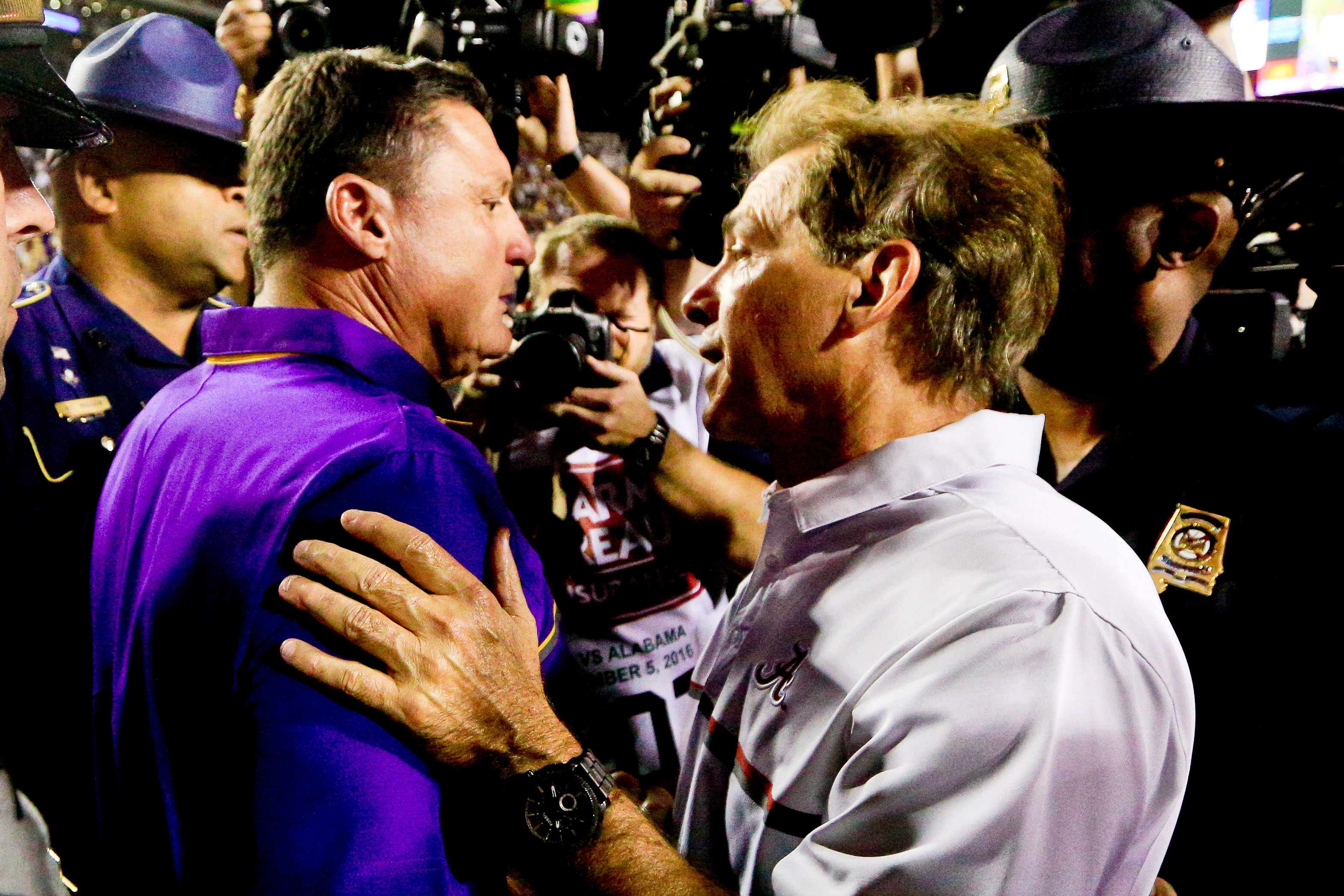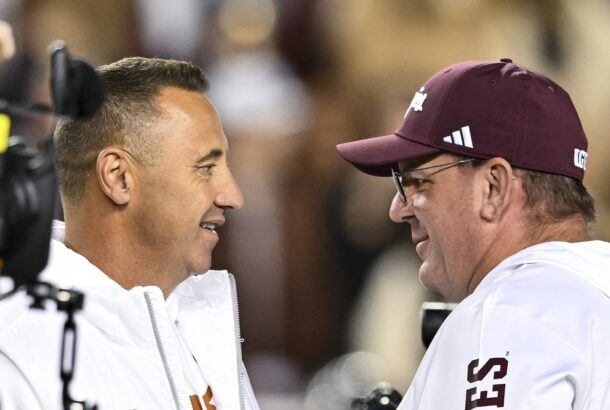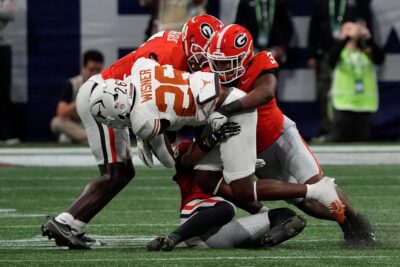Ad Disclosure

Things could have been much different.
It has been nearly 13 years since Nick Saban decided to try his hand as an NFL head coach, leaving LSU to take over the Miami Dolphins, only to decide after two undistinguished seasons that he was better off in college football after all.
When Saban decided to depart the NFL after compiling a 15-17 record, his successor at LSU, former Oklahoma State coach Les Miles, already was entrenched with the Tigers, so off Saban went to Tuscaloosa to take over as head coach at Alabama.
And the rest is history.
As the Tigers and the Crimson Tide renew their annual rivalry Saturday night in Bryant-Denny Stadium, both programs’ fortunes have changed significantly since Saban decided to put down roots.
Alabama has become the closest thing college football has had to a dynasty in more than a half century, winning four national championships in a seven-year stretch. LSU, despite winning a national championship under Saban in 2003, another one under Miles in 2007 and reaching the 2011 title game before losing to Saban and the Tide, has lost much of the ground it had made up when Saban began rebuilding the program in 2000.
But what if Saban hadn’t been tempted by the NFL? What if he had turned down the Dolphins as LSU was preparing to play in the Capital One Bowl after the 2004 season? What if the Crimson Tide had to find someone else to succeed Joe Kines, who coached one game as interim head coach in place of Mike Shula at the end of the 2004 season?
The buildup to this week’s game between the 19th-ranked Tigers and the top-ranked Tide, which will go a long way toward deciding the SEC West, might have gone something like this …:
************
Here we go again.
Alabama will try once again to end its losing streak against Nick Saban and LSU.
The Crimson Tide hasn’t been able to beat the Tigers since that memorable No. 1-vs.-No. 2 showdown during the 2011 season.
Of course, LSU avenged that defeat with a victory in the BCS Championship at the end of the season and Saban’s Tigers have been on a roll ever since, winning six consecutive games in the series while remaining the gold standard of college football.
In fact, Saban’s dominance goes back to his arrival in Baton Rouge from Michigan State before the 2000 season. LSU won four of his first five games against the Tide, and he became a hot commodity for college and NFL teams alike after he guided the Tigers to the BCS championship after the 2003 season. In addition to bringing LSU just its second national championship and first in 45 years, Saban compiled a 48-16 record in his first five seasons in Baton Rouge.
Saban, who was secondary coach of the Houston Oilers for two seasons and defensive coordinator of the Cleveland Browns for four seasons before going to Michigan State, was courted heavily by the Miami Dolphins to become their head coach and director of football operations in 2004. He famously said, “I’m not going to be the head coach in Miami” at the peak of speculation that he would accept the Dolphins offer.
In fact, Saban was on the verge of being hired by the Dolphins as LSU prepared to face Iowa on New Year’s Day. But on Christmas Day, he had a sudden change of heart and decided to stay put.
Saban also spurned overtures from Alabama, which was desperately trying to find someone who could restore its program to its previous glory after a series of failed tenures. After missing out on Saban, the Crimson Tide hired Oklahoma State coach Les Miles.
As Saban continued to build the Tigers into a dynasty, he was frequently pursued by NFL teams.
Saban turned down offers from the Green Bay Packers and the New Orleans Saints in 2006 and then the Pittsburgh Steelers in 2007, feeling he was on the verge of building another national championship at LSU. The Tigers rewarded his faith with a second national championship after the 2007 season.
Miles did in fact rebuild Alabama to a large degree, but Saban’s presence in the SEC West prevented Miles from fully realizing the return to glory that the Tide faithful craved. Saban made significant recruiting inroads in Alabama, periodically plucking elite recruits from under Miles’ nose to keep the Tigers atop the college football world.
LSU became practically an annual participant in the NCAA championship game, winning titles after the 2009, 2011, 2012 and 2015 seasons before losing to Clemson in the final seconds of last year’s title game.
Throughout that run, Saban was consistently a target of NFL franchises seeking someone to turn around their fortunes. Each year an NFL team would make an offer to Saban — 2008 (Ravens), 2009 (Buccaneers), 2010 (Cowboys), 2011 (Panthers), 2012 (Colts), 2013 (Cardinals), 2014 (Redskins), 2015 (Raiders), 2016 (Jaguars) and 2017 (Broncos) — but he steadfastly remained at LSU. Much to the dismay of Alabama and its fans.
Now in his 18th season with the Tigers, Saban is tied with TCU’s Gary Patterson for the second-longest tenure in college football, one year behind Iowa’s Kirk Ferentz.
The dean of SEC coaches will try Saturday to improve on his 8-3 record against the Crimson Tide and further strengthen No. 1 LSU’s case for yet another spot in the College Football Playoff.
But hope springs eternal in Tuscaloosa that this year — finally — will be the year that the losing streak comes to an end. Alabama is ranked 19th and enters the game on a three-game win streak.
The inability to defeat Saban more frequently ultimately contributed to Miles’ demise at Alabama despite a mostly successful 12-year tenure.
Now the Tide will try to end its recent futility against the Tigers in its first full season under Ed Orgeron, who was promoted from defensive line coach when the Tide dismissed Miles early last season.
Meanwhile, Saban’s name has been linked to potential NFL openings with the Browns, 49ers Colts and Giants.
************
But in reality, on Saturday night Orgeron will be on the LSU sideline and Saban will be on the Alabama sideline, trying to continue his mastery of the Tigers.
Les East is a New Orleans-based football writer who covers LSU for SaturdayDownSouth.com. Follow him on Twitter @Les_East.




